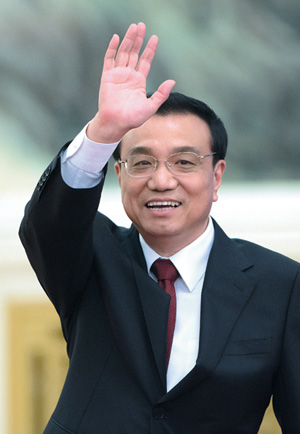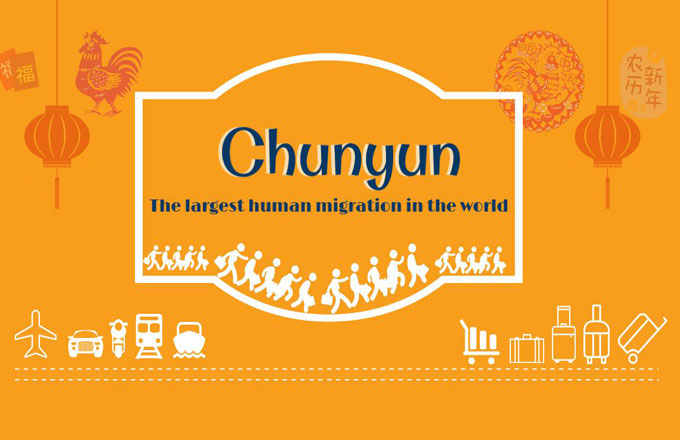The man of the people is a topic among the people
"And his command of English helps with the impression he has on Western audiences." said Moran.
Although Li did not speak in English at Sunday's media briefing, he has often displayed good command of the language during visits overseas.
|
 |
|
New Premier Li Keqiang waves as he leaves his first news conference after the closing session of the National People's Congress at the Great Hall of the People in Beijing. [Photo/Agencies] |
In the summer of 2011, the then vice-premier made a speech in English at the University of Hong Kong at celebrations marking its 100th anniversary.
Late last April, Li made an official visit to a number of European countries, including Russia, and was often spotted conversing in English with high-level foreign officials without the help of a translator.
"Li's ability to speak English will help make him real to the Western world," said Robert Berring, a law professor at the University of California, Berkeley, who teaches courses on the Chinese legal system. "If only the United States had leaders who spoke Chinese!"
Confident and humorous
Li Xingguo, a professor of public relations at the Chinese Academy of Governance, said he will include Li's post-NPC briefing as educational material in his classes to show young officials how to perform on such occasions.
"China's former premiers all had their own unique style when it came to media conferences; Zhu Rongji was very passionate, and Wen Jiabao loved to quote the classics," said Professor Li, adding, "Li's style is simple, professional, pleasant and smart. In general, he gives people a fresh outlook. He addresses big issues professionally, but in the form of small talk."
The professor was impressed with Li's handling of an "aggressive" question from a US reporter who asked about alleged Chinese cyberattacks in the US. The premier started his answer by jokingly suggesting that the reporter should receive a double salary because he asked the question in both English and Mandarin, a move that eased the tense atmosphere in the room.
He then used the legal term "presumption of guilt" to describe the question, which reflected his law degree background, said Li Xingguo.
The incident reminded the professor of the time a reporter from the US asked former premier Zhou Enlai why Chinese people always walk with their heads bowed. In response, Zhou laughed and replied that it was because "we are walking uphill".
"Li's debut media conference displayed his charm to the world as the premier of a large country, because he presented himself well and without affectation," said Li Chengyan from Peking University.
Li Xingguo said the premier's confident performance was the result of years of hands-on work experience at different levels. "I find that local officials have much better communication skills than those from ministries, because they meet all kinds of people. Some officials, especially those with higher degrees, tend to give big talks that are off-topic," he said.
Another notable episode at the media briefing was sparked by a question from a Hong Kong reporter, who told the premier that he had used lots of hand gestures during the discussion. The premier jokingly acknowledged that the journalist had reminded him that excessive use of gestures might distract the reporters from his answers. However, Li Xingguo said the effect was quite the opposite. "Proper hand gestures can help the audience better engage with the speaker," he said.
"During the 1976 US presidential election, Jimmy Carter was advised to integrate hand gestures in his speeches to attract the attention of the audience. He later became the 39th US president."
Hand movements also show the speaker has put his heart and mind into the content. Sometimes, such gestures can become a means of getting the message across because they help the audience identify the important points, added Li Xingguo.
Berring found Li's informal style and realistic goals appealing: "To my Western eye, this (a more relaxed style) is a good sign. If Li is comfortable in his own skin, he can accomplish more."
However, Berring also noted that the media briefing was only the first step and that the public is waiting to see if the new leaders will "walk the walk".
"Economic reform is difficult. Taking on corruption even more so," he said.
Bonnie Glaser, a senior adviser for Asia at the Freeman Chair in China Studies at the Center for Strategic and International Studies, said substance is more important than style, and implementation is more important than promises.
"The ultimate test is whether Li can carry out his pledges of economic and social reform that promise to improve the lives of the poor people who reside in the countryside, the migrants flooding into the urban areas and the retirees who are seeking affordable health care," she said.
Li acknowledges the challenges that lie ahead. "Talking the talk is not as good as walking the walk," he said.
The journey has begun.
Contact the writer at zhuzhe@chinadaily.com.cn.
Chen Weihua in Washington, Zhang Yuwei in New York, Chen Jia in San Francisco and Zhang Chunyan in London contributed to this story.
|
Sound Bites "General impression of Li at the news conference: Serious, attentive, disciplined. Leaders who are comfortable in their own skin, exposed to other cultures and languages, and well educated in a discipline make better leaders." Douglas Paal, Vice-president for studies at the Carnegie Endowment for International Peace, a Washington think tank "Li Keqiang's solid education in law and economics equips him with the knowledge a leader needs. Li is the first Chinese premier with a legal background. His rich experience is also a huge advantage, having worked as head of China's largest agricultural province, Henan, and the large industrial province of Liaoning. Li is a uniter who can rally people around him." Cheng Li, Director of research at the Brookings Institution's John L. Thornton China Center "Having studied both law and economics, Premier Li Keqiang should be as well equipped as anyone to take on these two enormous future challenges and guide China down a pathway to this long-promised goal." Orville Schell, Arthur Ross director of the Center on US-China Relations at the Asia Society "Substance is more important than style, and implementation is more important than promises. Li Keqiang said: 'Reforming is about curbing government power. It is a self-imposed revolution that will require real sacrifice, and it will be painful.' The ultimate test is whether Li can carry out his pledges of economic and social reforms that promise to improve the lives of poor people." Bonnie Glaser, Senior adviser for Asia in the Freeman Chair of China Studies, Center for Strategic and International Studies "Li's informal style appealed to me, as did his more realistic goals. I agree with him that we should wait and see if the new leaders walk the walk. Five words: Hope tempered with patience always. To my Western eye, this is a good sign. If Li is comfortable in his own skin, he can accomplish more. Li's ability to speak English will also help make him real to the Western world. If only the United States had leaders who spoke Chinese! Robert Berring, Law professor at the University of California, who teaches China's legal system "Li Keqiang's new-stated intentions are good to hear. However, observers will be waiting to see how life changes on the ground. It will be important to demonstrate real changes in the ways that the bureaucracy deals with the wider population." Rana Mitter, professor of the History and Politics of Modern China, Institute for Chinese Studies, University of Oxford "Li Keqiang and the new Chinese government aim to reduce ostentation and bureaucratic visits and fight corruption, which has been done in a very visible way at the highest levels. This appears to indicate the central government's commitment to a change in governance, which offers hope." Peter Ho, Chair professor of Chinese Economy and Development at Delft University of Technology in the Netherlands "One of the big challenges Premier Li Keqiang will face will be to reduce social inequalities, and especially inequalities between people living in cities and in the countryside. Therefore, the wish of the new Chinese government to create new cities and develop urbanization has to be supported by the international community. This can also provide very interesting opportunities for foreign companies in this sector." Bernard Dewit, chairman of the Belgian-Chinese Chamber of Commerce "The first paragraph of Li's speech highlights that we should closely follow the rule of law. One of the intentions of his repeated mentions of 'urbanization' has been to better promote it through discussion. Helping 'those who desire to integrate into city life' means to promote urbanization while complying with farmers' wishes, and not engaging in forced urbanization." Yi Peng, Research fellow at the National Development and Reform Commission's China Center for Urban Development "Li acted confidently, being familiar with economic and legal affairs, and had a clear line of thinking. He talked about policy objectives in his own words rather than bureaucratic expressions. He talked about the functions of government, corruption, institutional reform, urbanization, food safety, environmental protection, foreign affairs, Taiwan, Hong Kong, Macao and other important issues ... His manner of speaking and the commitments he made bring great hope to the Chinese people." Guan Qingyou, Assistant dean of Minsheng Securities Research Institute "I'm glad the voices of law professionals are getting stronger and their social status is higher. China must be led by those who know the law." He Bing, Deputy dean of China University of Political Science and Law "The premier's bachelor degree in law and doctorate in economics speak for themselves. He is clear of mind and strong in systemic logic." Wang Qi, Investment manager and head of trading at China Securities "Li's belief in being righteous and just, as well as doing things the correct way, guarantees the rights of the people and is truly the 'Voice of China'." Li Mingsheng, Author and three-time winner of the Luxun Literature Prize "Li's views on urbanization are exciting: Finding solutions suitable for local conditions, ensuring the protection of agricultural land and stressing food safety. It is gratifying to see him take the basic needs of the 250 million migrant workers into prime consideration." Chen Li, Deputy director of Shaanxi Provincial Public Security Department "Premier Li's down-to-earth speech shed light on the hope of the country and was very inspiring. " Lu Qiyuan, Director of Jinzongxin Investment, Shenzhen "His speeches match the mood of the audience; if he sees there is deep mutual understanding he will speak a lot. Kind and nostalgic, with integrity and truth, you can see no dishonesty in him." Li Gaolan, A writer in Hainan province |
- Li stresses trust is key element
- Li Keqiang - Premier of State Council
- Foreign leaders congratulate Li on election as premier
- Li sets out strategic mission for next 5 years
- Li vows to crack down on corruption
- Li reaffirms road of peaceful development
- Premier Li stresses reform, opening up
- Li pledges to prudently advance urbanization
- Premier Li Keqiang meets the press today
- Premier sets sights on economic growth
























